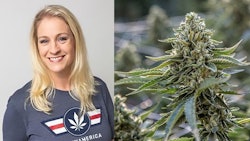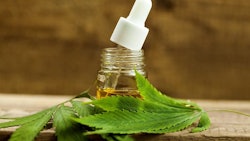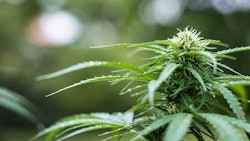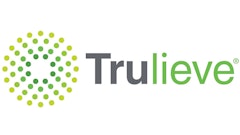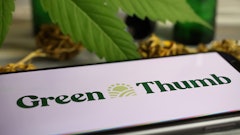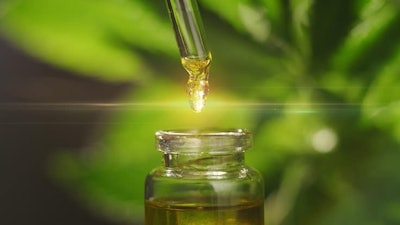
While cultivating hemp is now fully legal at the federal level, recent actions from the FDA may have the booming cannabidiol (CBD) product market pumping its brakes.
The U.S. Food and Drug Administration (FDA) recently published a revised Consumer Update, titled “What You Need to Know (And What We’re Working to Find Out) About Products Containing Cannabis or Cannabis-derived Compounds, Including CBD,” where it clarifies the legality of marketing CBD products and airs its concerns about the hemp-derived compound’s prolonged health effects.
In the Consumer Update, the FDA emphasizes that of all the oils, lotions, food, beverages and numerous other CBD products on store shelves, only one has been approved by the FDA—Epidiolex, a prescribed oral solution used to treat two rare, severe forms of epilepsy.
Otherwise, CBD that is marketed as a dietary supplement, added to food or labeled as any sort of cure or treatment for an ailment is technically illegal, as CBD products are subject to FDA regulations.
The regulatory crackdown comes on the heels of the FDA issuing warning letters to 15 companies in late November for illegally selling CBD products in ways that violate the Federal Food, Drug, and Cosmetic (FD&C) Act. The companies are required to respond with plans to correct the violations within 15 working days.
Many of the companies that received letters now have disclosures on the bottom of their web pages that explain the products were not evaluated by the FDA and are “not intended to diagnose, treat, cure or prevent any disease.”
The warning letter left some wanting answers, including Shiloh Thibodeaux, a founding member of Organix Industries Inc., doing business as Plant Organix.
“We are left with several questions regarding the warning letter. Why were we, along with 14 other companies, singled out while hundreds are left to continue business as usual? Why would the federal government legalize production and sale if only to be derailed by its own agency?” Thibodeaux says. “We are duly licensed to conduct CBD business and will respond to the FDA with legal ingredients in our products, ensuring required labeling is in place.”
Dr. Gregory Smith, the CEO of Red Pill Medical Inc., another company that received a warning letter from the FDA, tells Hemp Grower he was “pleased” to receive guidance from the agency. “There is so much confusion in the marketplace that I see this as an opportunity to work with the FDA to give companies clear guidance on what they can and cannot say. At this point, the industry simply gets told what they can’t say or do, but what we need is exact guidelines on what we can say and do,” Smith says.
In its consumer update, the FDA says it recognizes the “significant public interest” in CBD but warns of the numerous unknowns involved with using the compound in products. It adds that it is working to answer the unknowns through ongoing efforts, such as feedback from a recent FDA hearing and information through a public docket.
“As part of the drug review and approval process for the prescription drug containing CBD, it was determined that the risks are outweighed by the benefits of the approved drug for the particular population for which it was intended,” the FDA says in the Consumer Update.
With limited data available on CBD’s health effects so far, the FDA says its chief concerns include:
- CBD’s potential to harm users before they become aware of its effects.
- Noticeable side effects of CBD, which include “changes in alertness” (or drowsiness), gastrointestinal issues and changes in mood.
- The unknown aspects of CBD, which include:
- Its effect with prolonged use.
- Its effect on the developing brains of children.
- Its effects on developing fetuses or breastfed newborns.
- Its effect on others in special populations, such as the elderly, adolescents, pregnant women and pets.
- How it interacts with other herbs, botanicals and medications.
- Its effect on the male reproductive system.
Of notable concern is CBD’s potential for liver injury, which the FDA says it discovered during its review of the marketing application for Epidiolex. FDA says the risk can be managed under medical supervision, but its effects on general CBD users who aren’t monitored are unknown.
Another concern cited by FDA is CBD’s potential effects on the male reproductive system. FDA says studies in laboratory animals showed male reproductive toxicity, including in the male offspring of CBD-treated pregnant females.
For some, the FDA’s concerns stir up outlandish claims not yet backed by solid evidence.
“It's ironic that the FDA sends warning letters to CBD companies for allegedly making false claims, or medical claims, while the FDA is arguably making inaccurate, scientifically insufficient, and evidence-lacking claims about CBD and its effect on human health,” Morris Beegle, the co-founder and president of a group of hemp companies called We Are For Better Alternatives, tells Hemp Grower. “What the FDA has suggested lacks facts. This is the same fear-mongering approach governments have been using for 80-plus years.”
Smith agrees that the FDA’s concerns regarding CBD are “a little misleading.”
“The studies showing these problems were mainly done in animals who were given incredibly high doses of cannabis (if extrapolated to humans, no one under normal conditions could consume that much cannabis or CBD) that lead to liver issues. Also, the metabolism and absorption of CBD in the mice/rat model is very different than in humans,” Smith says. “I have maintained that clinically, the safety profile of CBD is excellent, especially when compared to any prescription medication. This is not to say that consumers with medical problems taking prescription medications should not use CBD with caution. Our model since day one was to make sure that consumers that are being treated for chronic illnesses, taking prescription medications, not take CBD without consulting a physician who is educated in cannabinoid medicine.”
The FDA says it is continuing to evaluate its regulatory framework regarding CBD based on information it receives, but concrete answers from the agency may be far off.
As the agency works to wrap its head around the increasingly popular product, it’s unclear how its stance will shape the industry. CBD products, however, are still fully marketable as long as they aren’t added to food, aren’t labeled as a dietary supplement and don’t make false claims.
Brightfield Group, a CBD and cannabis research firm, estimates the CBD market, currently worth $5 billion, will reach $23.7 billion by 2023.










